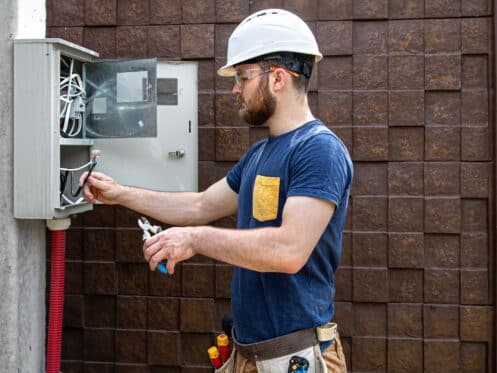Over time, all things in a home wear down. Your electrical wiring is no different. Not only does electrical wiring wear out when it’s used often, but we use a lot more electricity than we did in past decades, leading to the need for more efficient systems that can carry a heavier electrical load. Certain signs let you know an upgrade is needed, and they are as follows.
The Lights Flicker and Dim
If you notice that the lights in your home flicker or dim and then become bright again, there’s a good chance that your lightbulbs are not receiving the necessary amount of power to operate properly. Some people think that a faulty lightbulb is the problem, but the real issue is that loose wiring or bad circuits interfere with the flow of power. Additionally, if you have bad wiring, this can lead to a whole host of other problems, which include the potential of an electrical fire. It’s always best to have small problems checked out by a professional before a minor nuisance becomes a much bigger issue.
Outlets Have Brown Singe Spots or Are Shooting Sparks
If you notice that outlets are shooting sparks, it’s likely that components in your electrical system are nearing the end of their lifespan or the outlets are being overloaded. Connections may also be loose, and loose connections can cause a problem called electrical arcing. When electrical arcing occurs, electricity is jumping across connections, and temperatures can reach as high as 35,000 degrees. As your outlets are throwing out sparks, they are building up heat that can melt the insulation and even lead to electrical fires. If you’re seeing brown stains on your outlets, this means that there have been sparks coming out of the outlets in the past.
Electrical Shocks or Tingling Sensations
It’s tempting to think that receiving a slight electrical shock when you touch a cord or plug something into the wall is a minor nuisance, but this can be a more dangerous problem. If the cords to your appliances or electronic devices are in decent shape but you still get shocked by touching them or plugging them in, you need to contact an electrician because this is a sign of faulty wiring.
The Smell of Something Burning
If you smell something burning, you must act quickly. It’s possible that the insulation inside of your walls is increasing in temperature and is melting. If you do not act, a fire will start and spread quickly. Call an electrician immediately. Additionally, you must shut off the power at the electrical panel to the impacted area to avoid any further damage.
Circuit Breakers Tripping Frequently
A circuit breaker that trips frequently is a sign that you’re overloading the electrical panel. Because older electric panels are not designed to handle today’s electricity demands, older circuit breakers will overload. Modern homes use 100-amp breaker boxes, and these are higher than those installed in the past. In addition to having an older breaker box, you can cause an overload by using multi-plug adapters because you will force the circuit to handle more than it is designed. The installation of more appliances in rooms, such as kitchens and garages, can also cause an electrical panel to become overloaded because it is not designed to handle the strain. To remedy this, you will need a new electrical panel that is large enough to accommodate the needs of your household, and you’ll have to have your home rewired.
The Home Is Older and Hasn’t Had an Electrical Update
The exact length of time that electrical wiring can last will depend on the type of material that was originally used to construct it. For instance, copper wiring is durable, so it can last up to 100 years. On the other hand, some wiring can only last 25 or 30 years. If you’re not sure what kind of material was used in the wiring of your home, you should have an electrician check for you. Certain types of wiring, such as knob-and-tube wiring, cannot handle today’s power usage. Knob-and-tube wiring cannot be grounded, so this type of wiring cannot service any three-pronged devices or appliances. If your home was built between the late 1800s and the 1940s and has never had a wiring upgrade, chances are that your home has knob-and-tube wiring.
Aluminum wiring is not considered to be safe because it is more prone to electrical fires since it is softer than copper, and that makes it more likely to break down and cause hot spots. Aluminum wiring also expands more than copper, so wires can get trapped beneath screws and create loose connections that are in danger of overheating and starting electrical fires. If your home was built between 1965 and 1973 and has never had an electrical wiring update, there’s a good chance that you have aluminum wiring that needs to be replaced.
You Use Multi-Outlet Adapters
If you’re relying on multi-outlet adapters, there’s a good chance that you don’t have enough outlets for your needs. Modern homes have more outlets in every room compared to their older counterparts because we use more electricity than was used decades ago. Relying on multi-plug adapters isn’t ideal because there’s a greater chance that you’re overloading your system.
You’re Making an Addition to Your Home
If you’re adding to your home, you’ll have to check how much space you have left in your electrical panel. When adding on to their homes, many homeowners often need a new electrical panel, or they need to increase the size of their current one. Furthermore, you will need to have an electrician determine whether your electrical system needs to be upgraded before the addition can be built.
You Have Two-Prong, Ungrounded Outlets
If there are two-prong outlets in your home, this means that the outlets are not grounded. It’s important for outlets to be grounded because this serves as protection for your household and your electronic devices if a power surge occurs. If your outlets are grounded, excess electricity is directed away from your home and back to the ground. Grounded outlets also protect against electric shock.
Kitchens and Bathrooms Don’t Have GFCI Outlets
Having GFCI outlets in bathrooms and kitchens is the standard because outlets are located near a water source. GFCI outlets are designed to prevent electrical shock, which can be fatal. Furthermore, GFCIs can prevent electrical fires because they are designed to switch off upon detecting ground faults.
Your home is one of the greatest investments you will ever make. So, you naturally want to work with a company that can address any issues that arise. Our experts here at Hunt’s Services offer electrical services, and we can also provide you with heating, cooling, plumbing, and sewer services to ensure your home stays comfortable, functional, and safe all year round. If you reside in Tacoma, WA or any of the surrounding areas, call Hunt’s Services to learn more about how we can help.




